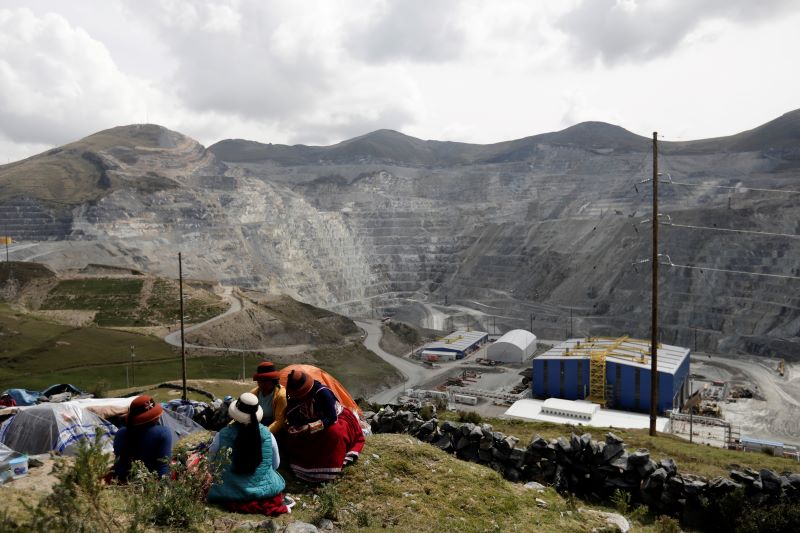As the rapid deployment of clean energy technologies fuels demand for their components, human rights abuses linked to the supply of critical minerals show no sign of letting up.
New data from a Transition Minerals Tracker compiled by the Business & Human Rights Resource Centre (BHRRC) shows that more than 630 allegations of human rights violations have been associated with minerals mining since 2010. Of those, 91 were made in the last year alone.
The tracker monitors human rights abuses associated with the extraction of seven minerals including copper, lithium and bauxite, which is new in this year’s update. These elements are essential for the production of solar panels, wind turbines, electric vehicles and electrification more broadly.
The latest BHRRC data points to widespread violations of Indigenous peoples’ rights – such as forced relocation, water pollution and denial of access to traditional land – as well as attacks on human rights defenders and workers’ rights abuses.
BHRRC also registered 53 allegations of work-related deaths since 2010, with 30 percent of those newly reported in 2023.
Supply chain FAQ: What you need to know about critical minerals
Caroline Avan, BHRRC’s head of natural resources and just transition, said the situation is not improving. “The sector is blatantly failing at protecting those who generate its profits, and this is only the tip of the iceberg,” she said.
“We are probably only capturing a fraction of abuses because we rely on public data and so many issues don’t get reported,” she added. The BHRRC gives companies an opportunity to respond to the allegations it documents.
Just ten companies are associated with more than half of all allegations registered since 2010 – including China Minmetals, Glencore, Grupo Mexico, First Quantum Minerals and Solway Group – while 46% of the total originated in South America.
Allegations of human rights abuses linked to transition minerals by category
Avan explained that many abuses follow a pattern that begins with environmental violations – such as water or soil pollution – compounded by inadequate consultation with local communities, which then leads to protracted conflict.
This has been the case at the Las Bambas copper mine in Peru, now owned by MMG Ltd – whose major shareholder is China Minmetals Corporation (CMC) – and formerly controlled by Glencore. It received the most allegations of rights abuses not only in 2023, but across the tracker’s full 13-year monitoring period.
The mine’s infrastructure, activities and expansion plans have led to a series of social and environmental impacts, provoking protests and blockades by Indigenous communities. Most recently, last November, 1,500 workers went on strike to ask for a larger share of profits.
CMC, MMG and Las Bambas have not responded to the BHRCC over the reported allegations.
New global principles
The persistence of human rights abuses in mineral mining is set to attract more attention, with the International Energy Agency estimating that mineral demand for clean energy applications is set to grow by three and a half times by 2030.
The BHRRC’s report notes that the mining sector is under pressure from civil society, Indigenous peoples and global policymakers alike to strengthen human rights protections.
For example, the new EU Batteries Regulation, adopted last July, obliges end users of battery minerals to carry out thorough supply chain due diligence.
“We are seeing the automotive industry asking more of the upstream mining sector, and that is good news,” said Avan. “But we are not seeing enough from the renewable energy sector in terms of asking mineral suppliers to ensure their operations are not linked with abuses.”
Days after climate talks, US slaps tariffs on Chinese EVs and solar panels
Last month, UN Secretary-General Antonio Guterres launched a high-level Panel on Critical Energy Transition Minerals tasked with developing a set of global principles to “safeguard environmental and social standards and embed justice in the energy transition”.
Guterres said supply chains must be “managed properly” to ensure that developing countries get a fair share of benefits and that the environment and human rights are protected.
“Too often, production of these minerals leaves a toxic cloud in its wake: pollution; wounded communities, childhoods lost to labour and sometimes dying in their work. And developing countries and communities have not reaped the benefits of their production and trade,” the UN chief said in comments at the launch.
“This must change… The race to net zero cannot trample over the poor,” he added. The panel is expected to deliver initial recommendations ahead of the UN General Assembly in September.
In Nagorno-Karabakh, Azerbaijan’s net zero vision clashes with legacy of war
The BHRRC’s Avan told Climate Home it was “concerning that countries in the Global North are rushing to sign strategic partnerships with resource-rich countries in the Global South because they want to secure their mineral supply chains, but the companies who will be involved in delivering those minerals are not asked much in terms of requirements for human rights protections”.
For companies, recommendations from the centre’s new report include adopting human rights policies and giving affected communities access to the benefits and governance of projects.
Avan said government regulation and better business practices are essential “to ensure that the global energy transition is a just one, centred on respect for human rights, fair negotiations and shared prosperity”.
“The alternative is rising resistance, conflict, and distrust – all threatening to slow the pace of the transition,” she added.
(Reporting by Daisy Clague, editing by Megan Rowling)
